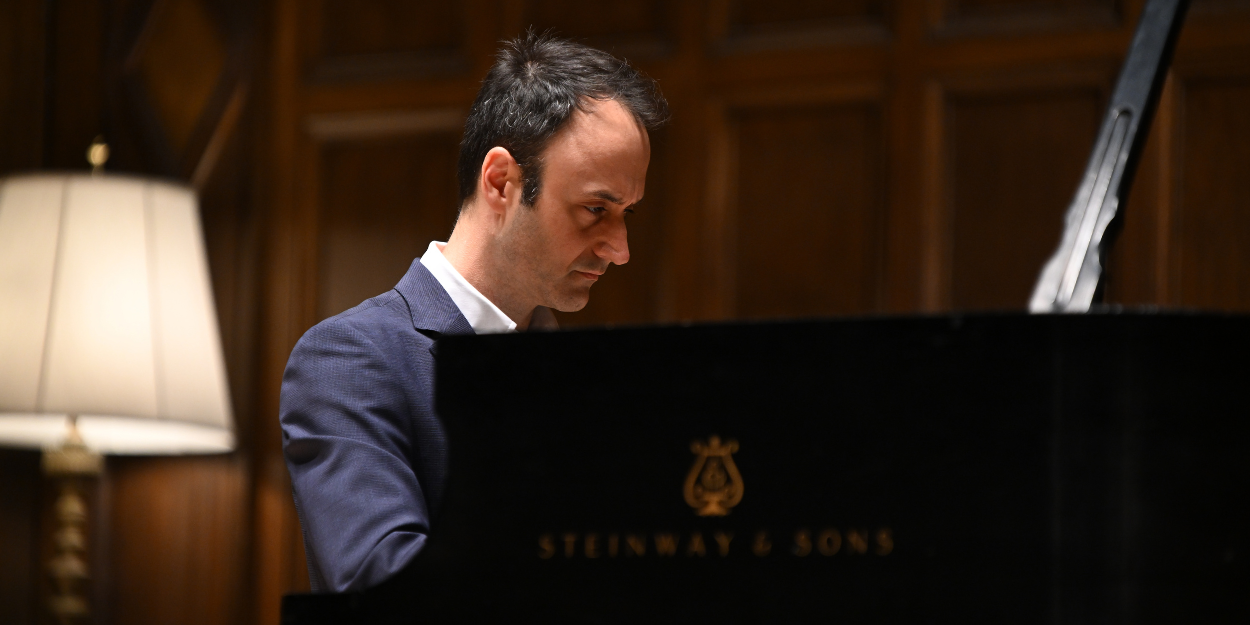Associate Professor of Piano Ran Dank—the newest member of Eastman’s piano department who performs a Faculty Artist Series recital on Saturday—doesn’t know what to say when he’s asked one of the most common questions of musicians: When did you start to play the piano?
At age three, he was hooked on a recording of Chopin waltzes performed by Arthur Rubinstein and listen to it on repeat on his Sony Walkman. “My parents barely were able to take me to the preschool that I was supposed to go to because I wanted to sit there at home and just listen,” he says.
It sparked almost three years of begging his parents for lessons before they eventually caved. Dank showed up to his first piano lesson demanding to play the Chopin waltzes. Predictably, his teacher told Dank they couldn’t start there—the waltzes include some of the most technically difficult rhythms and pianistic leaps and require a mature touch—and gave him an easy Chopin waltz typically given to children. The next week, Dank returned with the easy waltz mastered, and reiterated his wish to play the full waltzes. His teacher, again, put off the young Dank in favor of gradually building up his skills first.
That lesson turned out to be his last, for a while. “Apparently, I said something along the lines of, ‘fine, if I can’t play what I want, then I quit.’ And then for two years, I refused to play.”
Without lessons, Dank was still determined to play and spent the next years trying to imitate his older sister, who took lessons. He returned to piano lessons around the age of seven. As for the Chopin waltzes? “I did learn it in my first year, but it took a good part of the year in order to get to those,” he says.
It was also within that first year of his second stint of piano lessons that Dank was already entering competitions due to his innate talent.
Dank’s early penchant for Chopin, however, won’t come as a surprise for those who attended the Eastman School of Music Convocation on August 26, where Dank closed out the ceremony with a selection of Chopin Mazurkas, performed with the command of a pianist who has developed a long-term connection to the music. (See the bottom of this page for a video of the performance!)
Dank won’t perform Chopin for his first Faculty Artist Recital, on Saturday, September 14 at 7:30 p.m. in Kilbourn Hall. But he did choose two major works that require the same kind of connection to the music that transcends technique. The program includes Rachmaninoff’s Moments musicaux, a collection of six short form, improvisatory-like works, and the towering Liszt Piano Sonata in B minor.
“The most important thing is, once you have overcome the technical burdens, is to have this connection with these pieces because they are very, very challenging. But once you’re past that, it really is so much about the inner world of the composer.”
Dank’s thoughts on the works reflect the way he’ll approach them. He considers both pieces vehicles for self-expression, which may be a common way to describe many of the works in a pianist’s canon––but not for him. “I use that judiciously, because I don’t think most pieces are like that.” He says his recital works are especially moldable and malleable, more so than works by Beethoven, who was working through specific ideas in music, or even Chopin, whose music was much more authoritative. And once the form and ideas are mastered, “there is a sense of letting go of some elements and just allowing things to happen.”
Dank grew up in Israel and made connections to the United States through the American Israel Foundation, which helped subsidize his undergraduate and master’s degrees at Juilliard, where he also received an artist’s diploma. He studied with the piano titan Emanuel Ax. It’s also where he met his wife, pianist Soyeon Kate Lee, who currently shuffles between Rochester and New York City weekly to teach at Juilliard. The two pianists also frequently perform as a duo.
Dank’s career took flight when he won the Young Concert Artist auditions in 2009, which came with his first artists management and what he says was “the gateway to the more professional world.”
Although Eastman wasn’t on his radar as a professional landing pad before he joined the faculty last year, he did have a chance encounter that may have been foretelling. When Dank won the Young Concert Artists competition, he was in a clarinet-violin-piano trio that played a debut concert in Carnegie Hall, with a program that included a work called Nocturnes by Eastman alumnus Kevin Puts ’94E, ’99E (DMA). Coincidentally, Puts was at the concert and went up to meet Dank after the performance. It was a meeting that led to Dank performing Puts’s piano concerto Night.
Dank says that one of the main attractions to applying to teach at Eastman was the other faculty members: he knew practically all the faculty before applying. “They’re all wonderful people, very easy to work with and just a very good group,” he says. “It’s not always the way it works. It’s a work environment, sometimes for better or worse, and some piano faculties are notoriously dysfunctional. This is the complete opposite of this; it’s almost famously functional.
I think the students benefit from that too because they are in an environment that is very supportive.”
Faculty Artist Series Presents: Ran Dank
Saturday, September 14 | 7:30 PM
Kilbourn Hall
Tickets are $10; free to URID holders
Hear Dank’s performance at the Eastman School of Music’s 2024 Opening Convocation
on August 26, 2024 in Kilbourn Hall
Program:
Chopin: Mazurka in C Major, Op. 68, No. 1
Chopin: Mazurka in G Minor, Op. 67, No. 2
Chopin: Mazurka in A Minor, B. 140 (“Emile Gaillard”)
Chopin: Polonaise in Ab Major, Op. 53


